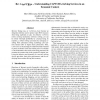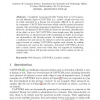110
click to vote
USS
2010
14 years 12 months ago
2010
Reverse Turing tests, or CAPTCHAs, have become an ubiquitous defense used to protect open Web resources from being exploited at scale. An effective CAPTCHA resists existing mechan...
106
click to vote
SICHERHEIT
2010
14 years 12 months ago
2010
A CAPTCHA is a program that generates challenges that are easy to solve for humans but difficult to solve for computers. The most common CAPTCHAs today are text-based ones where a ...
132
click to vote
CMS
2006
15 years 3 months ago
2006
Abstract. Completely Automated Public Turing Test to tell Computers and Humans Apart (CAPTCHA) is a
131
click to vote
NIPS
2008
15 years 3 months ago
2008
CAPTCHAs are computer-generated tests that humans can pass but current computer systems cannot. CAPTCHAs provide a method for automatically distinguishing a human from a computer ...
119
click to vote
SP
2010
IEEE
15 years 6 months ago
2010
IEEE
—Captchas are designed to be easy for humans but hard for machines. However, most recent research has focused only on making them hard for machines. In this paper, we present wha...
119
click to vote
EUROCRYPT
2003
Springer
15 years 7 months ago
2003
Springer
We introduce captcha, an automated test that humans can pass, but current computer programs can’t pass: any program that has high success over a captcha can be used to solve an u...
115
click to vote
ISW
2004
Springer
15 years 7 months ago
2004
Springer
CAPTCHAs are tests that distinguish humans from software robots in an online environment [3, 14, 7]. We propose and implement three CAPTCHAs based on naming images, distinguishing ...
120
click to vote
HIP
2005
Springer
15 years 7 months ago
2005
Springer
Abstract. Current CAPTCHAs require users to solve objective questions such as text recognition or image recognition. We propose a class of CAPTCHAs based on collaborative filterin...
WMCSA
2008
IEEE
15 years 8 months ago
2008
IEEE
We show how to convert regular keyboard-entry CAPTCHAs into clickable CAPTCHAs. The goal of this conversion is to simplify and speed-up the entry of the CAPTCHA solution, to minim...
134
click to vote
WCRE
2008
IEEE
15 years 8 months ago
2008
IEEE
CAPTCHAs are automated Turing tests used to determine if the end-user is human and not an automated program. Users are asked to read and answer Visual CAPTCHAs, which often appear...


